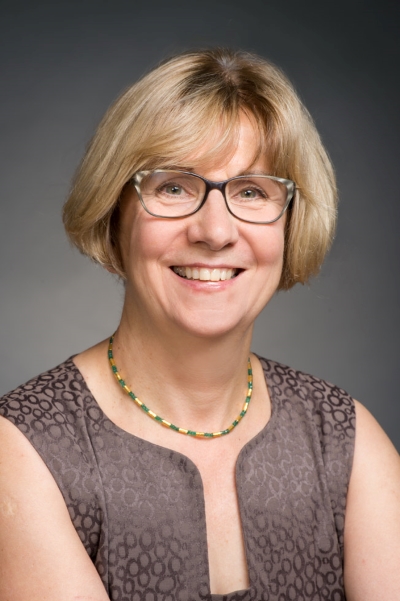
U of A clinician-scientist Barbara Ballermann reflects on 10 years as chair of the Department of Medicine.
As former chair of the Faculty of Medicine & Dentistry's Department of Medicine, Barbara Ballermann's leadership made a lasting impression on her colleagues and trainees. Since 2010, she left her mark as a passionate researcher, administrator, mentor and role model to many who worked alongside her while leading one of the largest departments at the university.
Ballermann, who handed over the reins to incumbent Narmin Kassam in April 2020, says that life as department chair was one of the most challenging and rewarding phases of her life, and she is looking forward to beginning a new chapter.
"The work had a habit of creeping into every free minute of my time," the University of Alberta nephrologist said. "The role requires a lot of thoughtful and balanced decision-making, a lot of collaborative work and a lot of peace-keeping. So, stepping away from it, I sometimes feel light as a balloon to have those duties lifted away."
Like conducting an orchestra
Ballermann attributes her successes to the collaborative efforts of other members of the department, including its executive team, central administrative team, divisional directors, and Laiji Li, research associate and long-time laboratory manager. Li says that the same qualities that make Ballermann a good researcher helped to make her successful in her role as chair.
"She is a very passionate researcher. It is very challenging to do everything that needs to be done as chair while keeping up with the lab, teaching students, and making sure you are producing publications," Li said. "It requires a kind of melodic thinking, because it is very hard to keep track of everything, and to be able to recall it when you need to. You need to keep everything moving forward while also anticipating your future activities. It's quite brilliant."
"It is a little bit like being a conductor of a highly accomplished orchestra, where the members are not only colleagues but friends," Ballermann said.
Narmin Kassam, newly appointed department chair, says she has renewed appreciation for Ballermann's leadership since taking over the role and experiencing it first hand.
"I think a major accomplishment that I have seen is the culture that she's helped grow," Kassam said. "We have such a strong team of administrative staff who manage all the day-to-day business without the frontline physicians. There's a lot of work that needs to happen for our academic and clinical duties to move forward, and I think she's helped build an exemplary team."
A mentor, role model and advocate
Ballermann considers mentorship one of her most important contributions to the department. Whether they were staff, peers, graduate students or clinical trainees, she learned that the department may have collective goals, but it is made up of individuals with their own perspectives, and helping people to succeed individually is vital to reaching the goals of the department.
Among her achievements is overseeing the largest number of promotions to professor for female faculty members in the department's history.
"She always pushed me to step outside of my comfort zone," said Kassam. " Whenever I would think that I couldn't do a task or assignment, she helped me recognize that it's okay to put yourself out there sometimes, and it will pay off in the long run."
Likewise, professor of medicine Vijay Daniels was a new faculty member when Ballermann became chair. He says that Ballermann has been a role model to him in explicit ways, such as performance reviews, but he has also learned a great deal from the implicit example she has set.
"What sticks out to me is that she is someone who is not afraid to speak up and comment on things that need to be commented on," Daniels said. "There are a lot of leaders who can do that, but they have their own agenda. Dr. Ballermann really does strive to understand and represent all the different interests of her departmental members, which allows her to represent us effectively."
Staying flexible through constant change
Part of growing into the role meant learning to consider different points of view, and to recognize that conflict sometimes arises from passion for a shared goal, Ballermann said.
"When I started, I looked forward to achieving some kind of equilibrium, but I learned instead that there is constant change-that equilibrium is just a dream. I learned that we really cannot foresee the crises we have to face, and that success in leading such a large department requires constant adaptation and readjustment without losing sight of the overall goals."
Ballermann has entered into a phased retirement process in which she hopes to return to her research, help her remaining PhD students successfully defend their theses, and publish a couple of papers she's been meaning to finish.
"During the next two years I will devote nearly all of my time to my laboratory. I am very lucky to have obtained a new CIHR grant that will allow me to complete studies on a major project in the lab. In the long run, I will go back to the other love of my life, which is literature and writing for fun," Ballermann said.
"I hope for her to feel happy with the legacy that she has left with the department," Kassam added. "It's now her time to focus on herself. The department was her family for a long time, but now she can actually focus on her true family and friends, and do the things that she loves."